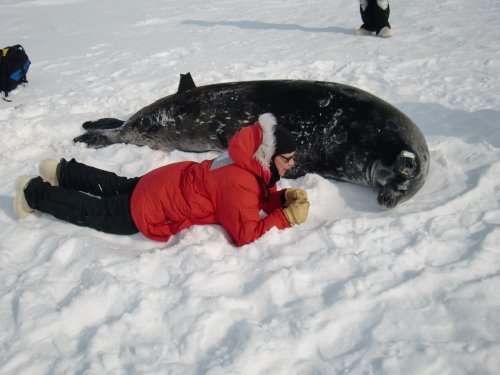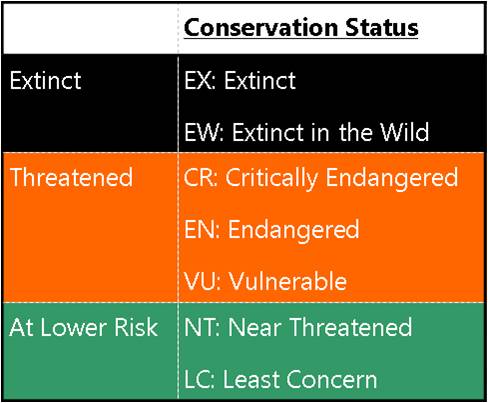Weddell Seal 'Stats' and Answers to Other Interesting Questions
This journal is brought to you by:
- St. Philomena Junior High
 A Closer Look - Seal 'Stats' - brought to you by St Philomena Junior High.
A Closer Look - Seal 'Stats' - brought to you by St Philomena Junior High.
Seal Stats
Data, data, data!! We are accumulating and analyzing lots of seal data. The team is taking measurements of mass, length and girth - among other things.
Let’s take a look at how these animals measure up!
Length
The scientists take two length measurements: curve length and standard length.
- Curve length is a measurement of the curvature of the seals body from the tip if the nose to the tip of the tail (not including the flippers).
 Curve length is linear measurement at these various points.
Curve length is linear measurement at these various points.
 Measuring curve length at various points
Measuring curve length at various points
- Standard length is a measurement of the seals length without the curve - so this measurement is always shorter. We hold the tape measure in a straight line - directly above the seal.
Stats
Of the seals we've tagged of far - here are their 'stats'
- Curve length measurement have ranged between 261cm - 287cm (103 to 113 inches)
- Standard length ranging between 236cm - 263cm (93 to 103 inches)
 Alex measuring up to the seal - don't quite make it do I?
Alex measuring up to the seal - don't quite make it do I?
That’s over 1 and a half times as long (or tall) as me. How do you compare? Send me your 'stats' at Ask the Team!
Weight
It's not easy weighing a seal - especially when they weigh between 332kg and 484kg (732lbs - 1067lbs). WOW! Unfortunately, we can't ask the seal to 'hop up on our scale' so we can get take a quick measurement - so we have a sling to help up with that. Check out this video - How to weigh a seal - in 27 seconds. But in reality... this process takes a little longer.
http://
Video credit Jesse Hiatt
Weddell Pups
 Weddell pup - Photo Credit: Michelle Shero.
Weddell pup - Photo Credit: Michelle Shero.
Since I'm getting a lot of questions about pups, I can't leave them out - even thought the pups are not so little any more. But, Weddell pups weigh between 22-30 kilograms at birth or about 49-66 pounds. That’s about the weight of an average full-grown dog. And they measure between 1.2-1.5m or about 4-5 feet in length.
Now we're talking - that's more my size! I wouldn't feel so small next to a Weddell seal pup!
Girth
Girth is the measurement or distance around a seal and these are taken in several areas.
 Girth is circular measurement around these various points.
Girth is circular measurement around these various points.
- Ankles
- Pelvis
- Umbilicus
- Mid
- Sternum
- Axial
- Neck
- Ears
These measurements (and others) are used to find a rough estimate of the seals body mass and volume.
Think about this A one-year old seal’s girth is around 129 centimeters - a little over 4 feet around. So - if you could hug a seal pup around its mid-section, would your arms reach all the way around? Try it! Measure your arm span to see. You might be able to do it – or at least come close. But remember, seal pups keep growing until they are about 5 or 6 years old!
Color
We're looking for seals that have molted (have shed their fur). And there is a noticeable difference in color between the unmolted seals and those that have completely molted. The unmolted seals are light brown to dark brown.
 This is a great molted seal. If fact, she was our 6th seal.
This is a great molted seal. If fact, she was our 6th seal.
As you can see, these seals are gray to silver in color, with some spots of lighter shades. Their undersides are slightly lighter and may be a bit spotted.
 We may have to wait a few weeks to tag this seal - she has not yet molted.
We may have to wait a few weeks to tag this seal - she has not yet molted.
How many are there?
Population: 800,000 – that is around the entire Antarctic. In McMurdo Sound, where I am now, the population is ~1000 animals (700 females, 300 males), plus the pups that are born each year (~400). The population in the entire Ross Sea is larger, but we don’t know how many.
Are they endangered?
Fortunately, Weddell seals are not on an endangered species. They have been classified by the IUCN - International Union for Conservation of Nature as an animal of Least Concern. Humans are also in this category. They are, however, a protected animal.
I thought you might be interested in the conservation status chart and titles.
 The Weddell seal is listed as an animal of least concern.
The Weddell seal is listed as an animal of least concern.
What’s in a name?
 Image of Captain James Weddell. Photo credit - antarcticguide.
Image of Captain James Weddell. Photo credit - antarcticguide.
Weddell seals were named after Captain James Weddell, a British sailor who commanded sealing expeditions to the Southern Ocean – near Antarctica. While commanding a ship called the Jane, Captain Weddell reached a latitude of 74°15' S – further south than any other ship had sailed. This record stood for more than 80 years. The Weddell Sea, near the Antarctic Peninsula, is also named in his honor.
The activity/animal depicted was conducted pursuant to NMFS Permit No 87-1851.

